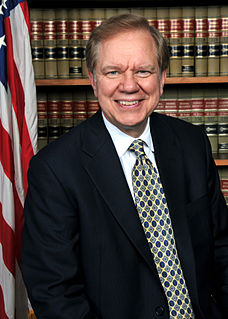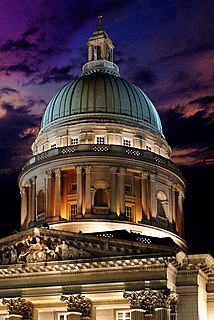Related Research Articles
Marbury v. Madison, 5 U.S. 137 (1803), was a landmark U.S. Supreme Court case that established the principle of judicial review in the United States, meaning that American courts have the power to strike down laws and statutes that they find to violate the Constitution of the United States. Decided in 1803, Marbury is regarded as the single most important decision in American constitutional law. The Court's landmark decision established that the U.S. Constitution is actual law, not just a statement of political principles and ideals, and helped define the boundary between the constitutionally separate executive and judicial branches of the federal government.

Article Three of the United States Constitution establishes the judicial branch of the federal government. Under Article Three, the judicial branch consists of the Supreme Court of the United States, as well as lower courts created by Congress. Article Three empowers the courts to handle cases or controversies arising under federal law, as well as other enumerated areas. Article Three also defines treason.
Landmark court decisions, in present-day common law legal systems, establish precedents that determine a significant new legal principle or concept, or otherwise substantially affect the interpretation of existing law. "Leading case" is commonly used in the United Kingdom and other Commonwealth jurisdictions instead of "landmark case" as used in the United States.

In English law, natural justice is technical terminology for the rule against bias and the right to a fair hearing. While the term natural justice is often retained as a general concept, it has largely been replaced and extended by the general "duty to act fairly".

Search and seizure is a procedure used in many civil law and common law legal systems by which police or other authorities and their agents, who, suspecting that a crime has been committed, commence a search of a person's property and confiscate any relevant evidence found in connection to the crime.

Separation of powers is a political doctrine originating in the writings of Charles de Secondat, Baron de Montesquieu in The Spirit of the Laws, in which he argued for a constitutional government with three separate branches, each of which would have defined abilities to check the powers of the others. This philosophy heavily influenced the writing of the United States Constitution, according to which the Legislative, Executive, and Judicial branches of the United States government are kept distinct in order to prevent abuse of power. This United States form of separation of powers is associated with a system of checks and balances.

The Supreme Court of the United States has interpreted the Case or Controversy Clause of Article III of the United States Constitution as embodying two distinct limitations on exercise of judicial review: a bar on the issuance of advisory opinions, and a requirement that parties must have standing.

The Montana Supreme Court is the highest court of the Montana state court system in the U.S. state of Montana. It is established and its powers defined by Article VII of the 1972 Montana Constitution. It is primarily an appellate court which reviews civil and criminal decisions of Montana's trial courts of general jurisdiction and certain specialized legislative courts, only having original jurisdiction in a limited number of actions. The court's Chief Justice and six Associate Justices are elected by non-partisan, popular elections. The Montana Supreme Court meets in the Joseph P. Mazurek Building in Helena, Montana, the state's capital, an international style building completed in 1982 and named in the honor of former Montana Attorney General, Joseph P. Mazurek.

Thomas Lee Ambro is a United States Circuit Judge of the United States Court of Appeals for the Third Circuit. He began his judicial service in 2000.

The Indian Judiciary is a system of courts that interpret and apply the law. It uses a common law system, inherited from the legal system established by former colonial powers and the princely states, as well as some practices from ancient and medieval times.

The Court of Disputed Returns in Australia is a special jurisdiction of the High Court of Australia. This jurisdiction was initially established by Part XVI of the Commonwealth Electoral Act 1902 and is now contained in Part XXII of the Commonwealth Electoral Act 1918. The High Court sitting as the Court of Disputed Returns hears challenges regarding the validity of federal elections. The jurisdiction is twofold: (1) on a petition to the Court by an individual with a relevant interest or by the Australian Electoral Commission, or (2) on a reference by either house of the Commonwealth Parliament.

Council of Civil Service Unions v Minister for the Civil Service [1984] UKHL 9, or the GCHQ case, is a United Kingdom constitutional law and UK labour law case that held the royal prerogative was subject to judicial review.

United Kingdom administrative law is part of UK constitutional law that is designed through judicial review to hold executive power and public bodies accountable under the law. A person can apply to the High Court to challenge a public body's decision if they have a "sufficient interest", within three months of the grounds of the cause of action becoming known. By contrast, claims against public bodies in tort or contract are usually limited by the Limitation Act 1980 to a period of 6 years. Almost any public body, or private bodies exercising public functions, can be the target of judicial review, including a government department, a local council, any Minister, the Prime Minister, or any other body that is created by law. The only public body whose decisions cannot be reviewed is Parliament, when it passes an Act. Otherwise, a claimant can argue that a public body's decision was unlawful in five main types of case: (1) it exceeded the lawful power of the body, used its power for an improper purpose, or acted unreasonably, (2) it violated a legitimate expectation, (3) failed to exercise relevant and independent judgement, (4) exhibited bias or a conflict of interest, or failed to give a fair hearing, and (5) violated a human right. As a remedy, a claimant can ask for the public body's decisions to be declared void and quashed, or it could ask for an order to make the body do something, or prevent the body from acting unlawfully. A court may also declare the parties' rights and duties, give an injunction, or compensation could also be payable in tort or contract.
Taylor v. Beckham, 178 U.S. 548 (1900), was a case heard before the Supreme Court of the United States on April 30 and May 1, 1900, to decide the outcome of the disputed Kentucky gubernatorial election of 1899. The litigants were Republican gubernatorial candidate William S. Taylor and Democratic lieutenant gubernatorial candidate J. C. W. Beckham. In the November 7, 1899, election, Taylor received 193,714 votes to Democrat William Goebel's 191,331. This result was certified by a 2–1 decision of the state's Board of Elections. Goebel challenged the election results on the basis of alleged voting irregularities, and the Democrat-controlled Kentucky General Assembly formed a committee to investigate Goebel's claims. Goebel was shot on January 30, 1900, one day before the General Assembly approved the committee's report declaring enough Taylor votes invalid to swing the election to Goebel. As he lay dying of his wounds, Goebel was sworn into office on January 31, 1900. He died on February 3, 1900, and Beckham ascended to the governorship.

Errors as to precedent facts, sometimes called jurisdictional facts, in Singapore administrative law are errors committed by public authorities concerning facts that must objectively exist or not exist before the authorities have the power to take actions or make decisions under legislation. If an error concerning a precedent fact is made, the statutory power has not been exercised lawfully and may be quashed by the High Court if judicial review is applied for by an aggrieved person. The willingness of the Court to review such errors of fact is an exception to the general rule that the Court only reviews errors of law.

Threshold issues are legal requirements in Singapore administrative law that must be satisfied by applicants before their claims for judicial review of acts or decisions of public authorities can be dealt with by the High Court. These include showing that they have standing to bring cases, and that the matters are amenable to judicial review and justiciable by the Court.
The Assistance of Counsel Clause of the Sixth Amendment to the United States Constitution provides: "In all criminal prosecutions, the accused shall enjoy the right...to have the Assistance of Counsel for his defence."
Criminal procedure in South Africa refers to the adjudication process of that country's criminal law. It forms part of procedural or adjectival law, and describes the means by which its substantive counterpart, South African criminal law, is applied. It has its basis mainly in English law.
South African administrative law is the branch of public law in that country which regulates the legal relations of public authorities, whether with private individuals and organisations or with other public authorities, or better say, in present-day South Africa, which regulates "the activities of bodies that exercise public powers or perform public functions, irrespective of whether those bodies are public authorities in a strict sense." According to the Constitutional Court, administrative law is "an incident of the separation of powers under which the courts regulate and control the exercise of public power by the other branches of government."
In Hlantlalala & Others v Dyanti NO & Another 1999 (2) SACR 541 (SCA); [1999] 4 All SA 472 (SCA) an important case in South African criminal procedure, the accused were a group of women from a rural area involved in a dispute regarding entitlement to use a piece of land. The women went on to the land and harvested mielies. The complainant charged them with theft.
References
- S v Shiburi 2004 (2) SACR 314 (W)